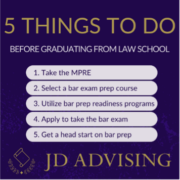How is Secured Transactions tested on the Multistate Essay Exam?
 How is Secured Transactions tested on the Multistate Essay Exam?
How is Secured Transactions tested on the Multistate Essay Exam?
Secured Transactions has been tested more and more frequently on the Multistate Essay Exam (MEE) and Uniform Bar Exam (UBE) as you can see from our Multistate Essay Exam frequency chart. It was tested in July 2017, both exams in 2016, February 2015, and several times before that. (Note that one of the components of the Uniform Bar Exam is the Multistate Essay Exam. So this post covers both how Secured Transactions is tested on the MEE as well as how Secured Transactions is tested on the Uniform Bar Exam!)
Many students get nervous at the thought of Secured Transactions being tested on the Multistate Essay Exam. Especially since many students encounter it for the first time in bar prep. And especially since it has been tested more recently (in fact we predicted that it would be coming up in July 2017 and it did).
But the good news is that if you know the basics of Secured Transactions, you can still pull off a decent score on the multistate essay exam. Here we tell you the highly tested areas of Secured Transactions on the multistate essay exam.
How is Secured Transactions tested on the Multistate Essay Exam?
Here is what is highly tested on the Secured Transactions questions on the Multistate Essay Exam (MEE):
- You should know the distinctions between the four kinds of goods – consumer goods (bought primarily for personal, family or household purposes), inventory (this is highly tested – examples include inventory at a store—e.g. anything being held for sale or lease, raw materials for that inventory, work in process, or materials used or consumed in a business), farm products (never tested), and equipment (anything that is not consumer goods, inventory, or farm products).
- Be able to say that there are three requirements for attachment – (1) value must be given by the secured party to the debtor (2) the debtor must have rights in the collateral; and (3) there must be a binding security agreement. This is heavily tested.
- Perfection is heavily tested too! You should know the different ways to perfect – filing, automatic perfection (for, for example, a PMSI in a consumer good), possession (not highly tested), and control (not highly tested).
- One principle that has been tested over and over: When two secured parties have a security interest in the same collateral, the first to file or perfect has priority. If no party perfects, then the first to attach has priority. This principle has been tested numerous times so make sure you memorize it and understand it!
- As a general rule, a buyer in the ordinary course of business takes free from a security interest even if it is perfected. This principle has been tested quite a fwe times.
- Default used to be tested pretty heavily but is not tested as often recently. It is still worth it to know the rules regarding default, notice requirements, “self help” etc. Some of the MEE answers are quite detailed regarding the notice requirements.
These are the basics of how Secured Transactions is tested on the Multistate Essay Exam. If you know these, you will be in a good position to pick up some or the majority of points on a typical MEE question. Note that of course the National Conference of Bar Examiners’ could write a really tricky question that covers even more details than what is above. They can (and have) done this in the past. However, making sure to nail down the basics and the vocabulary above is a good way to begin approaching this difficult subject.
Want to see more of the highly tested MEE topics?
 The NCBE tends to test certain topics within each subject more than other topics.
The NCBE tends to test certain topics within each subject more than other topics.
See this post for an overview of the highly-tested MEE topics for each of the Multistate Essay Exam subjects. If you are looking for an overview of the highly-tested topics on the MEE, check out our MEE one-sheets. These give you an overview of the highly-tested areas of the MEE in one sheet, front and back. We sell them in our online store.
We hope you found this Multistate Essay Exam advice useful! If you have any questions, please feel free to contact us at your convenience.
Looking to Pass the Bar Exam?
Free Resources:
- 🌟Bar Exam Free Resource Center: Access our most popular free guides, webinars, and resources to set you on the path to success.
- Free Bar Exam Guides: Expert advice on the MBE, the MEE, passing strategies, and overcoming failure.
- Free Webinars: Get insight from top bar exam experts to ace your preparation.
Paid Resources:
- 🏆One-Sheets: Our most popular product! Master the Bar Exam with these five-star rated essentials.
- Bar Exam Outlines: Our comprehensive and condensed bar exam outlines present key information in an organized, easy-to-digest layout.
- Exclusive Mastery Classes: Dive deep into highly tested areas of the MBE, MEE, MPT, and CA bar exams in these live, one-time events.
- Specialized Private Tutoring: With years of experience under our belt, our experts provide personalized guidance to ensure you excel.
- Bar Exam Courses: On Demand and Premium options tailored to your needs.
- Bar Exam Crash Course + Mini Outlines: A great review of the topics you need to know!
🔥 NEW! Check out our Repeat Taker Bar Exam Course and our new premier Guarantee Pass Program!



